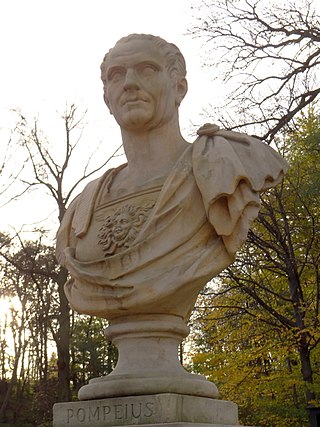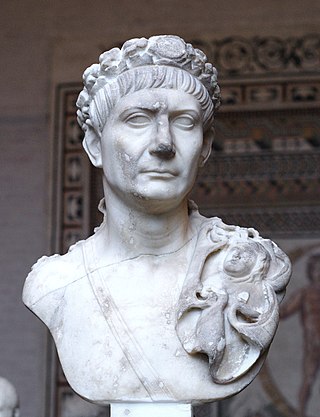Related Research Articles
The 90s ran from 90 AD to 99 AD.

Lucius Aelius Sejanus, commonly known as Sejanus, was a Roman soldier, friend and confidant of the Roman Emperor Tiberius. Of the Equites class by birth, Sejanus rose to power as prefect of the Praetorian Guard, of which he was commander from AD 14 until his execution for treason in AD 31.

The gens Pompeia was a plebeian family at ancient Rome, first appearing in history during the second century BC, and frequently occupying the highest offices of the Roman state from then until imperial times. The first of the Pompeii to obtain the consulship was Quintus Pompeius in 141 BC, but by far the most illustrious of the gens was Gnaeus Pompeius, surnamed Magnus, a distinguished general under the dictator Sulla, who became a member of the First Triumvirate, together with Caesar and Crassus. After the death of Crassus, the rivalry between Caesar and Pompeius led to the Civil War, one of the defining events of the final years of the Roman Republic.
Lucius Licinius Sura was an influential Roman Senator from Tarraco, Hispania, a close friend of the Emperor Trajan and three times consul, in a period when three consulates were very rare for non-members of the Imperial family, in 102 and 107 AD as a consul ordinarius. Fausto Zevi postulated that he was also suffect consul in 97, based on a plausible restoration of part of the Fasti Ostienses, which reads "..]us". However, two more recently recovered fragments of military diplomas show that the name of this consul is L. Pomponius Maternus, who is otherwise unknown. Most authorities have returned to endorsing C.P. Jones' surmise that Sura was consul for the first time as a suffect consul in the year 93. He was a correspondent of Pliny the Younger.
Quintus Pomponius Secundus was a Roman aristocrat of the first century, and consul suffectus in AD 41 as the colleague of Gnaeus Sentius Saturninus. His brother was the poet and statesman Publius Pomponius Secundus, and their half-sister, Milonia Caesonia, was the second wife of the emperor Caligula.
Quintus Sosius Senecio was a Roman senator who was favored by the emperors Domitian and Trajan. As a result of this relationship, he was twice ordinary consul, an unusual and prestigious honor: first in 99, with Aulus Cornelius Palma Frontonianus as his colleague; and again in 107 as the colleague of Lucius Licinius Sura, who was himself consul for the third time.
Quintus Junius Blaesus was a Roman novus homo who lived during the reigns of Augustus and Tiberius. He was the maternal uncle of Lucius Aelius Sejanus, the Praetorian Prefect of Emperor Tiberius.
Gnaeus Pompeius Longinus was a Roman senator and general. He was the 5th legate of Judaea from 85 to 89 and held the suffect consulship in the nundinium of September–October 90 as the colleague of Lucius Albius Pullaienus Pollio. He was deceived into a trap by Decebalus during Trajan's Second Dacian War, and rather than provide an advantage to the Dacian king, committed suicide.

The gens Vibia was a plebeian family at ancient Rome. Although individuals named Vibius appear in history during the time of the Second Punic War, no members of this gens are found at Rome until the final century of the Republic. The first of the Vibii to obtain the consulship was Gaius Vibius Pansa in 43 BC, and from then until imperial times the Vibii regularly filled the highest offices of the Roman state. The emperors Trebonianus Gallus and Volusianus each claimed descent from the family.

Nerva was Roman emperor from 96 to 98. Nerva became emperor when aged almost 66, after a lifetime of imperial service under Nero and the succeeding rulers of the Flavian dynasty. Under Nero, he was a member of the imperial entourage and played a vital part in exposing the Pisonian conspiracy of 65. Later, as a loyalist to the Flavians, he attained consulships in 71 and 90 during the reigns of Vespasian and Domitian, respectively. On 18 September 96, Domitian was assassinated in a palace conspiracy involving members of the Praetorian Guard and several of his freedmen. On the same day, Nerva was declared emperor by the Roman Senate. As the new ruler of the Roman Empire, he vowed to restore liberties which had been curtailed during the autocratic government of Domitian.

The gens Antonia was a Roman family of great antiquity, with both patrician and plebeian branches. The first of the gens to achieve prominence was Titus Antonius Merenda, one of the second group of Decemviri called, in 450 BC, to help draft what became the Law of the Twelve Tables. The most prominent member of the gens was Marcus Antonius.
The gens Titia was a plebeian family at ancient Rome. The gens is rarely mentioned in the Republican period, and did not rise out of obscurity till a very late time. None of its members obtained the consulship under the Republic, and the first person of the name who held this office was Marcus Titius in BC 31.

The gens Ulpia was a Roman family that rose to prominence during the first century AD. The gens is best known from the emperor Marcus Ulpius Trajanus, who reigned from AD 98 to 117. The Thirtieth Legion took its name, Ulpia, in his honor. The city of Serdica, modern day Sofia, was renamed as Ulpia Serdica.

The gens Sosia, occasionally written Sossia, was a plebeian family at ancient Rome. Members of this gens occur in history from the end of the Republic down to the third century AD. The first of the Sosii to attain the consulship was Gaius Sosius in 32 BC, and the family would continue holding various positions in the Roman state until the third century.
Sextus Erucius Clarus was a Roman senator and aristocrat. He was Urban prefect and twice consul, the second time for the year AD 146. Clarus was the nephew of Gaius Septicius Clarus, a friend of Pliny the Younger.
Lucius Publilius Celsus was a Roman senator as well as a confidant of the emperor Trajan. He was consul twice: the first time as suffect consul for the nundinium of May to August 102 as the colleague of Titus Didius Secundus; the second time as ordinary consul for the year 113 with Gaius Clodius Crispinus as his colleague.
Servius Sulpicius Similis was an eques of ancient Rome who held several imperial positions, both civil and military, under Trajan and Hadrian, culminating with praefectus or governor of Egypt from 107 to 112.
Titus Flavius Norbanus was a Roman equites who was active during the reign of Domitian. He is known for his activities while holding two imperial posts: governor of Raetia, and Praetorian prefect.
The gens Silia was a plebeian family at ancient Rome. Members of this gens are mentioned as early as the fifth century BC, but first to hold the consulship was Publius Silius Nerva, in the time of Augustus. The Silii remained prominent until the time of the Severan dynasty, in the early third century.
The gens Statia was a minor plebeian family at ancient Rome. Members of this gens are first mentioned in the early decades of the Republic, but the name does not appear again in history until the time of Cicero. The Statii remained relatively undistinguished until the reign of Trajan, when Lucius Statius Aquila was raised to the consulship.
References
- ↑ John D. Grainger, Nerva and the Roman Succession Crisis of AD 96-99 (London: Routledge, 2003), pp. 111f
- 1 2 Alison E. Cooley, The Cambridge Manual of Latin Epigraphy (Cambridge: University Press, 2012), p. 467
- ↑ Cassius Dio, 68.16
- ↑ AE 1939, 60
- ↑ Tacitus, Annales I.52, 64
- ↑ Syme, "Guard Prefects of Trajan and Hadrian", Journal of Roman Studies , 70 (1980), p. 65
- ↑ As noted by Syme, Tacitus (Oxford: Clarendon Press, 1958), pp. 54f
- ↑ Grainger, Nerva, p. 111
- ↑ Syme, "Guard Prefects", p. 66
- ↑ Epistulae , VI.33; VII.6.10,11